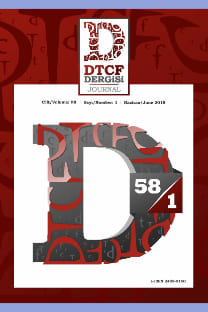“KEDİ KÖPEK SEVEN HERKES AHMAKTIR”: DELEUZE VE GUATTARİ'NİN SEVİMSİZ HAYVANLARI
Deleuze ve Guattari, merkezinde insanın olmadığı ontolojileri ve bilhassa hayvan-oluş kavramları nedeniyle hayvan çalışmaları literatüründe ilgi çekmektedir. Bu makale, Deleuze ve Guattari'nin Bin Yayla'daki “kedi köpek seven herkes ahmaktır” beyanına odaklanarak hayvan-oluş kavramının insan dışı hayvanlara insanlarmış gibi ya da merhametle davranmak gerektiği yönünde ahlâki bir çağrı yapmaktan ziyade, molar oluşumları başlangıç noktası olarak kabul eden özdeşlik temelli bir ontolojiden çıkış yolu teşkil ettiğini vurgulamaktadır. Deleuze ve Guattri'nin hayvan çalışmaları açısından özgünlüğü, oluşla ilişkili yeni bir sorumluluk türü ileri sürmelerinde yatar. Bu sorumluluk türü Hofmannsthal'a referansla ürettikleri sıçan-oluş kavramında en net formülasyonlarından birini bulur.
“ANYONE WHO LIKES CATS OR DOGS IS A FOOL”: DELEUZE AND GUATTARI'S UNLOVELY ANIMALS
Deleuze and Guattari attract much attention in the animal studies scholarship because of their rethinking of ontology in non-anthropocentric terms and their concept of becominganimal in particular. Focusing on Deleuze and Guattari's assertion in A Thousand Plateaus that “anyone who likes cats or dogs is a fool”, this article tries to show that becoming-animal is more a way out from an identitarian ontology that revolves around molar formations than a moral call for treating non-human animals as human beings or with pity. The originality of Deleuze and Guattari for animal studies lies in the fact that they point to a new form of responsibility in relation to becoming. This new form of responsibility nds its clearest formulation in the concept of becoming-rat, which Deleuze and Guattari develop in reference to Hofmannsthal.
___
Batukan, Can. “Heidegger ve Deleuze’de Hayvan Sorusuna Giriş.” Cogito 80 (2015): 70-85.Buchanan, Brett. Onto-Ethologies. The Animal Environments of Uexküll, Heidegger, Merleau-Ponty, and Deleuze. New York: SUNY Press, 2008.
Buchanan, Ian. “The Problem of the Body in Deleuze and Guattari, or, What Can a Body Do?” Body & Society 3.3 (1997): 73-91.
Calarco, Matthew. Zoographies: The Question of the Animal from Heidegger to Derrida. New York: Columbia University Press, 2008.
Deleuze, Gilles. Spinoza: Practical Philosophy. Çev. Robert Hurley. San Francisco: City Lights Books, 1988.
Deleuze, Gilles ve Claire Parnet. Gilles Deleuze: From A to Z, Yön. Pierre-André Boutang. Çev. Charles J. Stivale. Los Angeles: Semiotext(e), 2012.
Deleuze, Gilles ve Félix Guattari. Kafka: Toward A Minor Literature. Çev. Dana Polan Minneapolis: University of Minnesota Press, 1986.
Deleuze, Gilles ve Félix Guattari.What is Philosophy? Çev. Hugh Tomlinson ve Graham Burchell. New York: Columbia University Press, 1994.
Deleuze, Gilles ve Félix Guattari. A Thousand Plateaus. Çev. Brian Massumi Minneapolis: University of Minnesota Press, 2007.
Derrida, Jacques. The Animal That Therefore I am. Ed. Marie-Louise Mallet. Çev. David Wills. New York: Fordham University Press, 2002.
Ertuğrul, Tacettin. “Jacques Derrida: ‘Hayvan’ Meselesini İnsan-Hayvan İkiliğinin Ötesinde Düşünmek.” Cogito 80 (2015): 174-195.
Frohmann, Bernd. “Foucault, Deleuze, and the Ethics of Digital Networks.” Localizing the Internet: Ethical Aspects in Intercultural Perspective. Ed. Johannes J. Frühbauer, Thomas Hausmanninger ve Rafael Capurro. Munich: Wilhelm Fink, 2007.
Goh, Irving. “Becoming-Animal: Transversal Politics.” Diacritics 39.2 (2009): 37-57.
Goh, Irving. “Chuang Tzu’s Becoming Animal.” Philosophy East and West 61.1 (2011): 110- 133.
Heidegger, Martin. The Fundamental Concepts of Metaphysics: World, Finitude, Solitude. Çev. William McNaill ve Nicholas Walker. Bloomington & Indianapolis: Indiana University Press, 1995.
Kafka, Franz. “Akademi için Bir Rapor.” Hikâyeler. Çev. Kamuran Şipal. İstanbul: Cem Yayınevi, 2005.
Koyuncu, Emre. “İktidar ve Hayvanlar: Hayvan Meselesini Foucault ile Düşünmek.” Cogito 80 (2015): 86-97.
Lawlor, Leonard. “Following the Rats: Becoming-Animal in Deleuze and Guattari.” SubStance 37.3 (2008): 169-187.
Markula, Pirkko. “Deleuze and the Body Without Organs: Disreading the Fit Feminine Identity.” Journal of Sport and Social Issues 30.1 (2006): 29-44.
Regan, Tom. Empty Cages: Facing the Challenge of Animal Rights. Oxford: Rowman & Littlefield, 2004.
Singer, Peter. Animal Liberation. New York: Ecco, 2002.
Smith, Daniel W. “Deleuze and the Question of Desire: Toward an Immanent Theory of Ethics.” Parrhesia 2 (2007): 66-78.
Şimşon, Elis. “Levinas ve Bobby: Bir Köpeğin Levinas Etiğindeki Rolü.” Cogito 80 (2015): 37-51.
von Hofmannsthal, Hugo. “The Letter of Lord Chandos.” Vienna 1900 at University of Washington. Web. 22 Ocak 2020.
von Uexküll, Jakob. “A Stroll Through the Worlds of Animals and Men: A Picture Book of Invisible Worlds.” Instinctive Behavior: The Development of A Modern Concept. Çev. Claire H. Schiller. New York: International Universities Press, 1957. 5-80.
- ISSN: 0378-2905
- Yayın Aralığı: Yılda 2 Sayı
- Başlangıç: 1942
- Yayıncı: Ankara Üniversitesi Dil ve Tarih-Coğrafya Fakültesi
Sayıdaki Diğer Makaleler
AEAEA IS REVISITED: REVISIONIST MYTHMAKING STRATEGIES IN MADELINE MILLER'S CIRCE
LATİN AŞK ELEGEIASINDA PARACLAUSITHYRON
“KEDİ KÖPEK SEVEN HERKES AHMAKTIR”: DELEUZE VEGUATTARİ'NİN SEVİMSİZ HAYVANLARI
ANNIE ERNAUX'NUN LES ANNÉES (YILLAR) ADLI ESERİNDE TOPLUM, BELLEK VE YAZIN
A DRAMA OF DETECTION: SUSAN GLASPELL'S TRIFLES
ADÖLESANLARDA BOY VE AĞIRLIK ÖLÇÜMLERİ İLE ÖZBİLDİRİMLERİN KARŞILAŞTIRILMASI
Sibel ÖNAL, Ayşegül ÖZDEMİR, Başak KOCA ÖZER
GEORGIOS VIZIINOS'UN HİKÂYELERİNDE TOPLUMSAL CİNSİYET VE “ÖTEKİ” İMAJI
